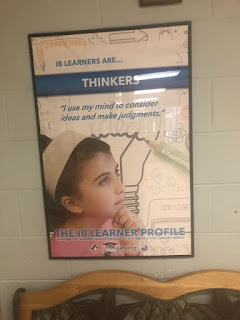Interlude Post
It is striking to me that I am writing my Interlude post while in the midst of experiencing an uncertain life interlude. Pondering the development of my living educational theory during this time of quarantine adds to the element of the surreal while also helping to drive my reflection on the truths of what is important in my life. McNiff (2012) talks about the art of narrative storytelling and the use of action research as a means of helping to produce, frame, and articulate a teacher’s living educational theory. This chapter spoke to me on many levels and in a multitude of ways. The older I get, the more I think about my beliefs and values, both for their role in my life and the ways in which I live them out. Do they serve others? Are they good? How do I use my values to drive my thinking and learning? How do you know if you are effective? How do you both assess and show accountability? McNiff (2012) discusses many questions similar to these in her writing and makes the case of narrative writing and action research often being left out within the educational field in favor of more accepted forms of social science research, becoming prey to hegemonic forces explaining away narrative forms of inquiry as not as valid or accepted as the canon of established research. I have often struggled with the dichotomy (real or imagined) between theory and practice so I am very intrigued by these points. McNiff (2012) states, “Narrative forms can transform value-based commitments into their lived articulation in the form of practitioner researchers’ networks, thus eradicating the artificial divides of them and us” (p.18). McNiff lists a series of questions she considers when telling her story, explaining the importance of crafting the explanation of how and what occurred as evidence of the final learning.
In considering my final post, an open letter to my students, it’s imperative to me to realize that a living educational theory is living. It’s not a stagnant, snapshot in time that encompasses everything. Rather, it’s a lived story in its own right, a journal or series of stories, if you will. This is especially important to me as currently the majority of my teaching is centered around helping teacher interns develop their teacher identity. McNiff (2012) claims, “research stories need to show explicitly how values have transformed into living standards of practice” (p.13). A living educational theory will encapsulate my values, educational beliefs, and learning but will also change, evolve, and grow with me as an educator. The last time I officially wrote a teaching philosophy (although I have pondered and updated) was during my student teaching internship, 17 years ago. Wow, umm…that kind of hurts to write. So much has changed (in my values and teaching) and I believe that my final post must reflect that. I will approach the letter with a past, present, future theme. I was an intern in a kindergarten class, became a stay at home mom for a decade, and now am just beginning anew as a teacher in higher education. Through it all, I think building relationships is the driving force behind my values as an educator. This is the theme that runs through my life as an educator and was easier to account for as a kindergarten teacher. How do I provide evidence of my effectiveness as a teacher of adults? How do I transfer in person relationships with children and their parents to an online environment?
I struggle with articulating philosophical points and value type arguments. These are the in person conversations I avoid and worry about. I blame growing up with cows for making me ultra-realistic and pragmatic. I’m good with facts, with discrete teaching points, with dedicated contact, but how I assess myself? How I articulate what I believe? How do you stay true to your beliefs without imposing on your students? McNiff (2012) states, “this means I have to articulate how I account for myself which brings me to how I judge my practice and how I understand the good in good practice”. I believe that this is what I have to explain in my living educational theory. It isn’t playing to my strengths necessarily but is ultimately vital to myself as a teacher and to my students. It is imperative that they know what I value (which is them) and how I shall assess myself in my learning. I definitely hold myself to be a lifelong learner and articulating my living educational theory will give me a start to the series of stories I shall tell as an educator.
References:
McNiff, J. (2012). My Story is My Living Educational Theory. Handbook of Narrative Inquiry: Mapping a Methodology, 308–329. doi: 10.4135/9781452226552.n12

This comment has been removed by the author.
ReplyDeleteHi Sarah,
ReplyDeleteThis is great. I'm excited to read your final post. You and I have lived a bit more life that the rest of our classroom community, so we have a bit more to account for :)
I don't believe that this assignment does not play to your strengths. You have walked an incredibly interesting path and I see your values reflected in the many choices you have made. As a pragmatist, your values are deeply reflected in what you take for granted--in your habits and in your everyday life. This is good. All humans are like this. Some just think that their values are something apart from their everyday life. You see that two are deeply connected.
Nothing happens that is not an opportunity to clarify and live out our values.
I look forward to your final post. Please shoot me a note if you have any questions you want to talk through while you are working on this.
Take care,
Kyle